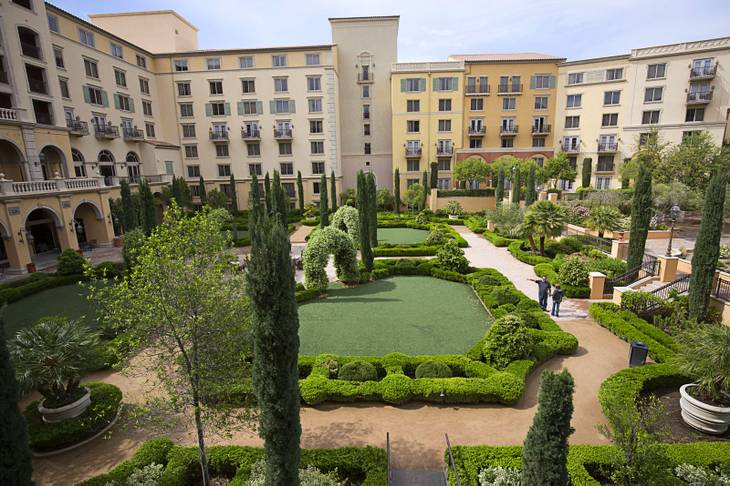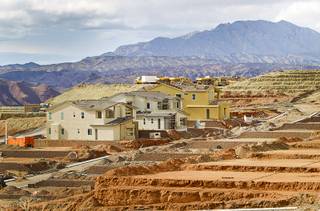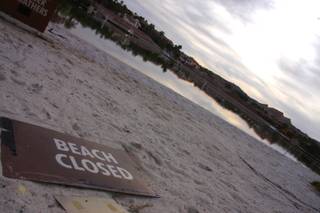Driving through the main entrance of Lake Las Vegas, there are signs of life in the faux-Mediterranean village in the desert.
A man-made waterfall, shut off years ago, is flowing. At a golf course that had been closed and allowed to turn brown, the grass is green, sprinklers are on and the shuttered clubhouse is being turned into a private athletic club. New housing tracts are underway nearby.
This opulent Henderson community was one of the biggest real estate flops in one of the hardest-hit markets in the country during the recession, crushed by an avalanche of financial problems. Has it finally turned the corner?
Not quite. Like the rest of Southern Nevada’s real estate industry, Lake Las Vegas is showing signs of improvement, but it could take years before it’s firmly back on its feet.
The project’s lakeside retail village is laced with empty storefronts. Sales of new homes and condos dropped sharply the past few years. And its former casino, which shut down a few years ago for the second time, is now an occasionally used events center, after state regulators denied the landlord’s application for a gaming license.
Restaurants do a brisk business, but overall, the sparsely filled retail district “looks pretty bad” and is one of the biggest obstacles to luring more residents, said mortgage lender Dan Means, who lives in Lake Las Vegas.
“It’s pretty ugly,” Windermere Prestige Properties owner Robyn Yates said of the retail area, where her brokerage firm has an office. “It’s so sad because it’s such a beautiful place.”
With its golf courses, luxury hotels, mansions, 320-acre man-made lake and history of wrecked finances, Lake Las Vegas for years has symbolized the excess and pitfalls of the valley’s anything-goes real estate market. The 3,600-acre project, off Lake Mead Parkway east of Boulder Highway, is making headway under New York billionaire John Paulson, who acquired about 1,000 acres the past few years, spent tens of millions of dollars on upgrades, is opening a lakefront grocery and controls the community’s broader development.
Other investors are laying bets, as well, with new construction, renovations and steeply discounted real estate purchases.
“We’re seeing a lot of positive things happening in Lake Las Vegas,” said Windermere agent Vicky Crichton, who lives and works in the community. “It’s just a slow process, and I don’t think that’s a bad thing.”
***
In 2015, though, the Lake Las Vegas homebuilding industry had slowed to a crawl.
Homebuilders closed five sales in Lake Las Vegas last year, down from 33 in 2014 and 65 in 2013, Home Builders Research founder Dennis Smith said. Builders last year pulled 15 permits for residential units, down from 63 in 2014 and 51 in 2013, according to Greg Toth, senior planner for the city of Henderson.
Only a few builders sold houses in Lake Las Vegas the past few years, industry pros said, but sales totals could start climbing again, as new subdivisions are taking shape.
Homebuilders Century Communities, William Lyon Homes and Ryland Homes have launched their first projects in Lake Las Vegas. High-end builder Toll Brothers also is reviving a boom-era townhouse project that stalled when the economy tanked, leaving some lots undeveloped, according to city records.
Efforts to speak with Century’s Nevada division president, Don Boettcher, were unsuccessful. A spokeswoman for Ryland parent CalAtlantic Group did not respond to requests for comment.
Toll Brothers marketing manager Lisa Kaplan said company officials “would prefer not to discuss specifics right now.” She provided a statement by division vice president Larry Wandel, who said the community's strengths included its golfing, trails and “resort feel.” As for the weaknesses, Lake Las Vegas has fewer amenities — “grocery, drugstore, gas station, etc.” — than other communities and is 15 to 20 minutes from major freeways, he said.
William Lyon marketing director Kim Chitwood said no area of the valley was spared during the recession, though Lake Las Vegas “was probably hit the hardest.” But now, as Paulson’s group sinks money into the community, her company is developing two projects there, including a luxury subdivision with a private beach.
“We’re excited,” she said.
Raintree Investment Corp. President Patrick Parker, whose group is leading Lake Las Vegas’ development for Paulson, said it was “intentional” that new-home sales dropped sharply. He said his group didn’t sell any land to homebuilders for a few years, as Raintree officials were trying to improve Lake Las Vegas as a whole and were “letting the market recover.”
He didn’t elaborate, but the strategy could help Raintree book higher sales prices if the project at large were to become more stable.
Paulson’s group sold project sites to Ryland and William Lyon last fall, and Parker said other deals were under contract. He said Paulson was fetching about $350,000 to $400,000 per acre.
Throughout Southern Nevada, land sold for a median of about $317,000 per acre last year, according to brokerage firm Colliers International.
Meanwhile, Lake Las Vegas’ resale market didn’t slow as much as new construction the past few years, at least in some ways. Buyers picked up 52 single-family homes last year, compared to 53 in 2014 and 57 in 2013, according to the Greater Las Vegas Association of Realtors’ resale-heavy listing service.
Condo deals, however, have fallen sharply amid rising prices. There were 27 sales last year, for a median price of $225,000, compared to 89 sales in 2010, for a median $120,000, GLVAR data show.
A few weeks ago, Windermere’s staff looked at its listings in Lake Las Vegas and tried to figure out why homes weren’t selling. Condos in particular weren’t moving, and the staff figured one reason was that high homeowners association dues were making such homes “a lot to swallow,” Yates said.
Condos in Lake Las Vegas often are a buyer’s second home. People could more easily pay cash when prices were rock-bottom, so they didn’t mind forking over some $500 a month in HOA dues because they didn’t have a mortgage, Yates said.
Now, buyers might have to get a loan because of the rising prices, and HOA dues are proving “a deal-killer,” she said.
***
Leslie Turzer was walking around Lake Las Vegas’ retail district, MonteLago Village, recently while attending a conference. A retiree in Henderson, she used to take visitors to stroll through the project’s boutique shops and art galleries.
Turzer described Lake Las Vegas as an oasis and said she enjoyed its “wonderful free concerts." But with the retail district now sagging under empty stores, she doesn’t take people there anymore.
The village, as the retail area is known, is home to some restaurants and real estate offices, as well as a coffee shop, a chocolate store and some other tenants. Paulson’s group plans to open Seasons Market, a 5,000-square-foot “resort-style” grocery, in May.
Many of the stores, however, are empty.
“It’s sad,” Turzer said.
Several businesses closed in the past two years, Means said. Windermere’s Crichton, for one, saw eviction notices posted on some stores.
Listing broker Rob Hatrak, of Virtus Commercial, says the 56,000-square-foot village is 58 percent occupied. Even in 2009, as the economy was spiraling, the village was 91 percent occupied, he said.
Some new tenants are on the way — a gelato shop and a photography studio have signed leases, according to Hatrak. He said the village needed a “good tenant mix” and would get a boost from Seasons Market.
The village used to be heavy on luxury goods, with practically nothing that appealed to the “everyday shopper crowd,” Hatrak said. He remembers, for instance, when visitors could buy a $20,000, handblown glass jellyfish.
“It’s funny, but it’s not a joke,” he said.
Towering over the retail district is the former Casino MonteLago, now dubbed the Lake Las Vegas Event Center. The casino opened in 2003, closed in 2010 when the adjacent Ritz-Carlton shut its doors, reopened in 2011 to a fireworks show and throngs of gamblers, then closed again in 2013.
At the time, management with Intrepid Gaming said it “suspended operations” pending a “resolution of lease issues with the property owners.” It did not elaborate.
Kam Sang Co., based in Arcadia, Calif., bought the property in 2012. Senior Vice President Phil Wolfgramm said recently the casino was losing money, and he indicated the operators wanted an investment or subsidy from Kam Sang.
Las Vegas-based Intrepid, now called Intrepid Hospitality, did not respond to a request for comment.
Two years ago, state casino regulators put the kibosh on the landlord’s efforts to reopen the gambling hall: The Nevada Gaming Commission in spring 2014 unanimously denied a license application by Kam Sang founder Man Ho “Ronnie” Lam, who wanted to license himself and the property.
The facility has played host to only a few events since becoming an event center, according to Wolfgramm: piano recitals around Christmas and a dueling pianos show last month.
Its future remains uncertain. Wolfgramm said his company might try to reopen the casino again or sell the property, though his group also has discussed leasing the property to a casino operator.
One thing’s for sure: The casino struggled and didn’t generate much foot traffic, according to people who live or work at Lake Las Vegas.
Hatrak, for one, says he never saw the casino “as a tremendous benefit” to the community. And Means, Finance of America Mortgage’s Las Vegas area manager, said it “was pretty empty.”
“It wasn’t a big attraction for us,” Means said.
***
Lake Las Vegas started taking shape nearly 30 years ago. Developers broke ground in 1987, began building its dam in 1988 and were diverting water from the Las Vegas Wash by 1990 to help fill the man-made lake. Homes, golf courses, hotels and the retail village followed.
But when the economy crashed last decade, Lake Las Vegas was on life support. According to reports:
Developers lost the project to foreclosure after defaulting on $540 million in loans in 2007. The Atalon Group acquired it in 2008 but pushed the project into bankruptcy protection six months later. Tourism and hotel-room rates plunged; foreclosures soared; new-home sales dried up; two of its three golf courses closed; and even the waterfall was turned off.
Builders, for instance, sold about 215 new homes there in 2007, then 76 in 2008 and 41 in 2009, according to a 2010 report.
As investors gobbled up cheap homes throughout the valley to turn into rentals, Lake Las Vegas had plenty of bargain-hunters, too. There was one foreclosure sale in Lake Las Vegas in 2007, then 27 in 2008 and 208 in 2009.
Paulson, founder of hedge-fund operator Paulson & Co., made billions betting against subprime mortgages. He also invested in Lake Las Vegas when prices were cheap. In summer 2012, he bought a reported 875-plus acres of land for $17.3 million, or about $20,000 per acre. He later added to his holdings.
Paulson’s group has spent more than $30 million the past three years on communal upgrades, Parker said. It provided $5.5 million for a $12.9 million extension of Galleria Drive that opened in fall 2014. It reopened Reflection Bay golf course around the same time. And it turned the other shuttered golf course, the Falls, into open space and is converting its former clubhouse into a private athletic club called Seasons LLV, with tennis courts, swimming pools and a private soccer field.
Windermere’s Yates said she had “tons of confidence” in the developers.
“They’re really committed to making it successful,” she said.
Other investors are betting on Lake Las Vegas — and like Paulson, they’re paying steep discounts from the boom years.
R.Y. Properties, of Alhambra, Calif., bought 127 acres for $12.5 million in late 2014. According to listing brokers with the Hoffman Co., previous owners paid $47 million for the land a decade earlier and spent $16.3 million on grading and other development costs.
R.Y. consultant Steve Jenkins said the company still was “weighing all of the options” for the property.
Meanwhile, county records show that San Diego investment firm Pacifica Cos. bought the 493-room Westin Lake Las Vegas hotel property out of foreclosure in December. The company paid $25 million — 84 percent less than what previous owners paid in 2006.
The Westin is embarking on a $30 million renovation, Parker said. Hotel management did not return a call seeking comment.
Other changes could be on the way. Hatrak said the retail village was up for sale, with a base asking price of $10 million — far below the $23.5 million the owners apparently paid in 2007.
According to Yates, it’s “feast or famine” in the village. Athletic contests, wine tastings and other events pump in pedestrians, but without those gatherings, “it’s just really slow,” she said.
All told, the village is a “key to success” in Lake Las Vegas, and “we’ve got to get it fixed,” Means said.
Executives with village owner Pacific Capital, of Roseville, Calif., did not respond to a request for comment.
Despite the history of problems, residents say they enjoy living at Lake Las Vegas, and people are optimistic about its future. Means, for instance, says he “wouldn't live anywhere else” in the valley — he plays golf every Sunday at Reflection Bay and eats dinner in the village’s restaurants a few times per week.
“I love it out there,” he said.
Custom-home builder Philip Kaffka, founder of Level Development Group, lives and works in Lake Las Vegas. He says the lake is “a resource that will never be duplicated in the West,” amid water concerns, and there are “so many things” happening in the community that are “so positive.”
“For the life of me, I can’t understand why people aren't lined up to move here,” he said.


